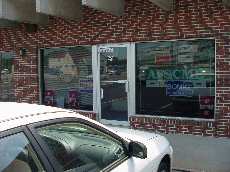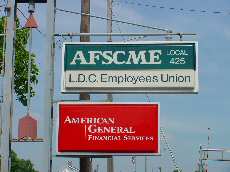|
In the late 1970s the facility became
the Lincoln Developmental Center. At that time several thousand
residents were sent out to other places. Some of the facility was
closed.
As Local 425 continued to grow in
members, it needed bigger office space. It brought in more dues it
and could afford a larger office. Approximately 10 years ago Local
425 moved from its location on South Chicago Street to 626 N.
Chicago. It is at this address that the local remained until it
officially closed on July 2.
The closing has brought about much
sentiment. When Roy Lawry heard, he commented: "From the start of
the local to its final days, 425 members fought for the good of the
developmentally disabled residents they served. With Local 425, LDC
has been a much better home for thousands of the disabled who
learned to live full, more productive lives. It will be sorely
missed."

Dan Senters, the president of Local 425
from November 1978 through December 1998, said, "The members need to
realize that they are the union. We couldn't have been so successful
without our members."
The local and the facility have had
their share of ups and downs during the past 60 years. In the 1990s
it was with a lot of support from the members of Local 425 that LDC
attained national status as the first large state facility in the
country to become accredited under the new outcome-based measures.
AFSCME members shared the makeup of the accreditation committee with
facility management. They traveled together throughout the country
promoting these measures.
The past four years have seen a
tremendous struggle waged by the local to keep Lincoln Developmental
Center's doors open. During 2001 and 2002 Local 425 was at the
center of the battle. The union hall became headquarters in the war
against Gov. George Ryan's plans to close the facility.

When speaking about the union
activities, Sherry Jennings said, "I learned a lot -- about freedom
of speech and rights and security."
Don Todd, president of Local 425, said,
"There was always something going on at the union hall. "We had Dan
Senters come into the hall on a daily basis to coordinate rallies,
hearings in court, political lobbying and news conferences. Council
31 worked with Senters to keep the pressure on the governor, and we
were constantly working at the hall to win the fight."
During that period many political
leaders from across Illinois joined forces with the local in the
struggle. Many officials, including state Sen. Larry Bomke, Rep.
Bill Mitchell and Illinois' current lieutenant governor, Pat Quinn,
came to the hall to support the union and LDC. Mayor Beth Davis was
also a frequent visitor. The union hall also had coverage from
newspapers and television news stations statewide.
After the Health Facility Planning
Board ruled on Aug. 15, 2002, that Gov. Ryan could legally close LDC,
paving the way for the facility's official closure on Aug. 31 last
year, the local union chose to keep its doors open.
"We still had lots of work to do. We
were not just going to close down," Todd said. "We intended to win
the war to keep LDC open. I talked to Council 31 Executive Director
Henry Bayer, and he agreed that we should keep the hall open."
Todd, Charlie Sanders and Senters began
volunteering their time at the hall. The hall became the place that
people who were laid off would come to for help in finding work.
Sanders and Kim Dennison worked through the Illinois Employment
Agency to help people find jobs and also assisted them with
unemployment issues. The local always had people coming in to help
out, find out information, raise issues or simply to visit.
The union originally hoped to resurrect
LDC during the 2002 fall legislative session. When this did not
happen, they came back to lobby during the spring session of 2003.
People were at the hall throughout
these times, calling legislators, working for political friends of
LDC, walking precincts and calling people to get out the vote during
the 2002 election. People came to the hall to catch a bus to go to
Springfield and lobby during the fall session.
"We returned to Springfield again in
the spring of 2003," said Todd.
[to top of second column
in this article] |

By the end of February 2003 the hall
was out of money. With all of its members laid off, the local had no
dues money coming in. LDC, however, remained closed and the local's
work was still not finished.
At this time Local 425 supporters and
those who had fought alongside them came forward to help keep the
hall open. AFSCME Local 2073 from the Department of Corrections
contributed $700 to help the local make it through the month of
March. The Lincoln Parents Association helped them through April,
May and June.
In April Illinois' new governor
committed to Sen. Bomke that he would reopen LDC. At the end of June
the money for reopening the facility was in the new budget. AFSCME
Local 425 had played a significant role in every part of the LDC
struggle and now saw its work come to a successful conclusion.
Council 31 has assumed responsibility
for the hall until they can move everything out of it. Todd said,
"Without dues money to keep the hall open, and realizing that when
LDC reopens the size of the membership will not sustain an office of
its current size, it was not feasible to keep the hall open." With
the work at the union hall finished, the hall is now officially
closed.

Many of the local's members are not
happy with the decision to close the hall. Some, like Lyle Horner,
said, "With the reopening it would make sense to hold on a few more
months and save the expense of starting over."
Karen Hughes summed up the hard reality
that past members are facing when she said, "It was hard enough to
see LDC close."
Employees give numerous reasons for the
hall to remain open.
"The union hall was our last means of
getting job information, checking seniority lists, and more
importantly it was a place where everyone could keep in touch with
each other and give each other moral support," Patty Detmers said.
"The stigma of losing our jobs still affects a lot of us greatly!
Not only have some of our residents passed away, but a lot of people
are still facing financial hardship."
Diane Underwood commented, "It's not
just a union hall, it's a reunion hall."
Diane Sizemore said, "The union hall is
a place that I could go and still feel that I had a chance to get
back to the job that I loved."
"Now more than ever the union hall is
needed as a source of information and assurance that members' rights
are protected." said Ester Gill.

"Without the hall there is no one we
can contact with questions and concerns that have been through the
LDC closing and can truly understand how we are feeling," Vicky
Faber remarked.
"I hope that the hall stays open so the
union can continue helping displaced workers with personal issues,"
Marilyn Cisco said.
Nikole Swartz said that she thinks it's
sad everything is closing. "We provided one of the best services
around for families with disabilities," she said. "We provided a
home for families that didn't have one or we were their extended
family."
There is a lot of sadness at the hall
closing. "It's strange," Charlie Sanders said, "I've spent so much
time here."
Council 31 will still be available to
help members with issues during the interim when the union hall is
closed. When LDC reopens the union will resume as a local.
"I'll miss
it," Todd said. "It's been a symbol of support for our members
through these difficult times. It's been a bastion of strength for
nearly 60 years for its members and the residents of LDC. The union
hall has been a part of the Lincoln community, and Local 425 has
been a great part of Council 31. My only consolation is that the
members who return to LDC when it reopens will be the same people
who made Local 425 and LDC great in the first place. I have to feel
good about that."
[LDN] |